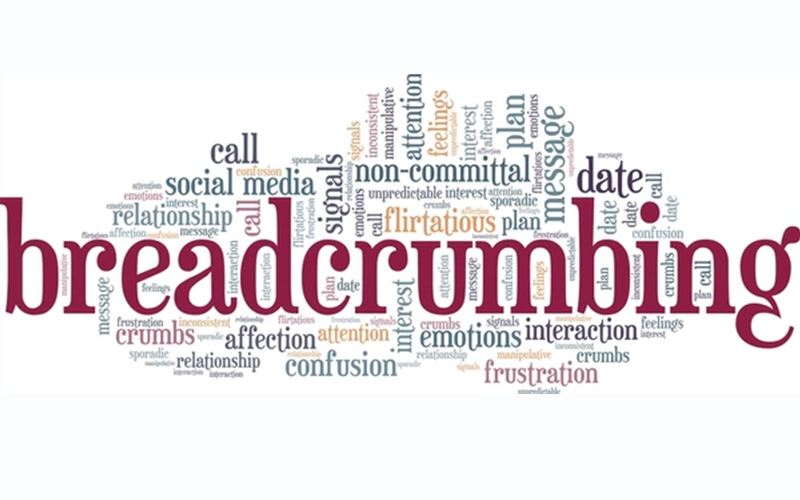BREAD-CRUMBING FAQs

1. What motivates a person to engage in bread crumbing?
Individuals who engage in bread crumbing may do so for a variety of psychological reasons, such as a fear of commitment,
enjoying the attention without the responsibility of a relationship, or not being sure about what they want. Sometimes,
it's also a power play or a way to keep their options open.
2. How can you tell if you are being bread crumbed?
- Inconsistent Communication: They reach out sporadically, often after long periods of silence.
- Surface-level Engagement: Conversations tend to be superficial, with no real depth or plans for the future.
- Avoidance of Commitment: They avoid making plans or commitments, often cancelling plans last minute or giving vague excuses.
3. What are the psychological effects of being on the receiving end of bread crumbing?
- Low Self-esteem: Constant uncertainty can lead to self-doubt and a decrease in self-worth.
- Anxiety and Stress: The unpredictability of interactions can cause significant anxiety and stress.
- Attachment Issues: It may exacerbate or trigger issues related to attachment, leading to patterns of anxious or avoidant relationships.
4. What does bread crumbing say about someone's emotional maturity?
Engaging in bread crumbing often indicates a lack of emotional maturity in individuals. It reflects an inability
or unwillingness to communicate openly and honestly about one's feelings, intentions, and the nature of the
relationship. Sometimes, bread crumbing is a manifestation of deeper issues such as fear of intimacy or
vulnerability. Individuals might find it safer to maintain a distance rather than expose themselves to the
potential of getting hurt.
5. How does bread crumbing fit into modern dating culture?
The rise of digital communication and dating apps has made bread crumbing more prevalent. The ease of sending messages
without investing much time or emotional effort contributes to this trend. As casual dating becomes more common, some
individuals might use bread crumbing as a way to keep things light and non-committal, often at the emotional expense
of the other person involved.
6. Can self-awareness and personal growth help someone stop bread crumbing others?
Recognizing one's own bread crumbing behaviour is the first step toward change. This requires honest self-reflection
and a willingness to understand the underlying motivations. Working on personal growth, including emotional maturity,
communication skills, and understanding of one's needs and fears, can help individuals move away from bread crumbing.
Therapy or counselling can be instrumental in this journey.
7. What strategies can therapists recommend to someone dealing with bread crumbing?
CBT can help individuals recognize and challenge the negative thought patterns that arise from being bread crumbed,
fostering a healthier self-image. Practicing mindfulness and self-compassion can help individuals maintain a sense
of self-worth and emotional balance, reducing the impact of bread crumbing. Therapists can work with individuals to
identify and cultivate characteristics of healthy relationships, including mutual respect, communication, and
shared values.
8. How can society shift away from bread crumbing and towards healthier communication?
Education on emotional intelligence, including empathy, self-awareness, and healthy communication, can contribute to a
cultural shift. Encouraging values of authenticity, vulnerability, and respect in relationships can help reduce the
prevalence of bread crumbing. Media and technology platforms can play a role in promoting healthier relationship models
and providing resources for understanding and navigating modern dating challenges.
9. How does social media influence bread crumbing behaviour?
Social media platforms can exacerbate bread crumbing behaviours by offering easy, low-effort ways to give someone attention
without meaningful engagement. Likes, comments, or sporadic messages can keep someone hooked without fostering a real
connection. The culture of comparison on social media might lead individuals to bread crumb others, as they seek more
"ideal" partners based on superficial criteria or keep their options open due to the fear of missing out (FOMO) on
someone "better".
10. How does one rebuild trust after experiencing or engaging in bread crumbing?
Honest and open communication about past behaviours, feelings, and intentions is crucial. Acknowledging the pain caused by
bread crumbing and expressing a genuine desire to change can help rebuild trust.
Actions speak louder than words. Demonstrating consistency in behaviours, making efforts to be more present, and engaging in meaningful interactions can help restore trust over time. Both parties need to have patience with the process. Trust is rebuilt gradually, and setbacks may occur. Understanding and empathy from both sides support healing and growth.







